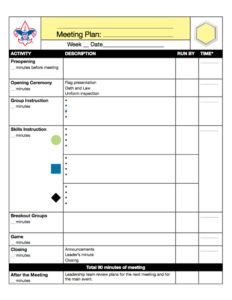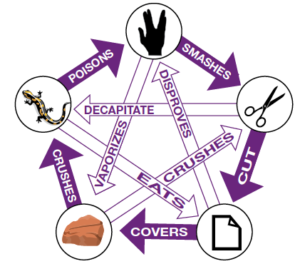Printable PDF file of Meeting Plans and Ideas for Mentoring
OBJECTIVES
This month’s activities should:
- Help Scouts understand our differences and how we are all unique
- Explain the difference between coaching and mentoring
- Show what is involved in maintaining a quality mentoring relationship
- Explain the evolution of a mentoring relationship
- Help Scouts select the appropriate mentoring model for the situations they come across
- Show Scouts how to maintain a quality mentoring relationship
LEADERSHIP PLANNING
As a leadership team, you may want to discuss the following items when choosing mentoring as your program feature during your planning meetings.

- Which of our members has had advanced leadership training?
- What should we do for our main event?
- What costs will be involved with our main event?
- What great mentors do we know who could
serve as presenters? - What other program topics could we combine with mentoring?
- What changes should we make to the sample meeting plans that would fit our needs better?
PREOPENING IDEAS
Preopening Ideas on Troop Program Resources
- As Scouts arrive, have them write down their favorite color, favorite food, and which states they have lived in, and draw a picture of their family. (This information can be shared later during breakout group sessions.)
- As Scouts arrive, have them play “Rock Paper Scissors Lizard Spock”.
- As Scouts arrive, play “Popcorn”.
OPENING IDEAS
Opening Ideas on Troop Program Resources
GROUP INSTRUCTION IDEAS
Understanding Each Other
- Have an expert lead a discussion about how youths change and develop over time. A good resource is the ages and stages information in the Troop Leader Guidebook, volume 1.
Listening—What Makes a Great Mentor
- Have a speaker discuss the importance of listening. Key points:
— Since we have two ears and one mouth, we should listen twice as much as we talk.
— Honest listening is at the heart of building a trusting relationship.
What Went Well, What Didn’t Go Well, and What Can Be Improved
- Discuss reflection techniques. Explain that when attempting a challenge, a high-performing group will always ask these questions:
— What went well?
— What didn’t go well?
— What can be improved next time? - Discuss how this technique can be used to improve group performance.
Attributes of a Good Mentor
- Discuss the learning continuum:
— Level One. You read about it.
— Level Two. Someone teaches you about it.
— Level Three. You learn from hands-on experiences.
— Level Four. You become proficient by practicing the skill.
— Level Five. You teach the skill to others. - Discuss the difference between coaching and mentoring.
- Discuss the attributes of a good mentor, such as open-mindedness, patience, listening ability, availability, communication skills, honesty, and support.
SKILLS INSTRUCTION IDEAS

Understanding Each Other
 Explore judging people by how they dress. Look at photos of different people in magazines and discuss what we think of them based on appearance. Discuss how we make such judgments and whether that’s right or wrong.
Explore judging people by how they dress. Look at photos of different people in magazines and discuss what we think of them based on appearance. Discuss how we make such judgments and whether that’s right or wrong.
 Discuss prejudice.
Discuss prejudice.
— Discuss how people react to others regarding race, age, gender, sexual orientation, religion, and nationality.
— Discuss whether being in these different groups changes one’s perspective. How?
 Take a standardized test to discover your own traits. This could range from a “What Cartoon Character Are You?” quiz to a more formal assessment like the Myers-Briggs Type Indicator personality assessment. Free Test.
Take a standardized test to discover your own traits. This could range from a “What Cartoon Character Are You?” quiz to a more formal assessment like the Myers-Briggs Type Indicator personality assessment. Free Test.- Compare results among group members and discuss areas of similarity and difference.
Listening—What Makes a Great Mentor
 NOTE: The skills portion of this meeting consists of three listening activities. While these activities do increase in complexity, Essential, Challenging, and Advanced skills are most likely displayed in the content given.
NOTE: The skills portion of this meeting consists of three listening activities. While these activities do increase in complexity, Essential, Challenging, and Advanced skills are most likely displayed in the content given.- The Story You Heard – Read a short story, and have the members paraphrase it. Notice how members choose to interpret and prioritize certain information over the rest.
- Ignore This – Pair up youth, and have one person discuss a hobby or passion he or she has, while the other person is instructed to ignore the speaker. Discuss the frustration that can come with not feeling heard or acknowledged, and review the body language and verbal remarks that a good listener should practice.
- Where I Want to Go – In pairs, one member discusses a type of location he or she would like to visit, giving only subtle hints as to the specific place. The listener will have to pick up on these subtleties and at the end, recommend somewhere suitable for the speaker based on the explanation. The original speaker will confirm or deny the usefulness of the suggestion. The two will then discuss ways that people can remain alert as listeners, picking up on the appropriate cues to help them play a more vital role in discussions.
What Went Well, What Didn’t, Go Well, and What Can Be Improved
 The skills portion of this meeting consists of various initiative games. Refer to: Library of Team Building Activities on Troop Program Resources. After each initiative game, evaluate what went well, what did not go well, and what could be improved.
The skills portion of this meeting consists of various initiative games. Refer to: Library of Team Building Activities on Troop Program Resources. After each initiative game, evaluate what went well, what did not go well, and what could be improved.
Attributes of a Good Mentor
 The skills portion of this meeting consists of various leadership tasks. Like initiative games, leadership tasks are purposeful activities with specific goals and learning processes that also include a reflection. The major difference is that here, the reflection is focused specifically on the performance of the leader.
The skills portion of this meeting consists of various leadership tasks. Like initiative games, leadership tasks are purposeful activities with specific goals and learning processes that also include a reflection. The major difference is that here, the reflection is focused specifically on the performance of the leader.
— Due to the sensitive nature of this type of reflection, make sure to review the list of things to consider in Initiative Games and Leadership Tasks.
— After each activity, evaluate what went well, what did not go
well, and what could be improved.
— Refer to: Library of Team Building Activities on Troop Program Resources.
BREAKOUT GROUP IDEAS
Getting Ready for the Main Event
- Menu Planning (if applicable)
- Duty Roster Planning (if applicable)
- Patrols discuss what special items they will need for the main event.
Preparation for the meeting’s game or challenge
GAME AND CHALLENGE IDEAS
Library of Team Building Activities on Troop Program Resources
—> Initiative Games and Leadership Tasks
- Popcorn
– Materials: One lightweight, inflatable beach ball per group of four to eight Scouts
– Method: Have each group form a circle. Tell them they are popcorn poppers and that the ball is a popcorn kernel. Their objective is to hit the ball in the air from team member to team member without it touching the ground. They should count each time the ball is hit. If the ball hits the ground, they must start their count over.
– Give them a minute or so and then ask them to try the popcorn popping again. After a couple of minutes, stop the game and ask again how many hits each team got. Remind them that a good leader evaluates what went well, what didn’t go well, and what could be done differently the next time. Have the Scouts discuss how to improve their process. Give them a couple of minutes to try again.
– Scoring: Have each group record every attempt. The group that has improved the most from the very first to the very last wins.
– Note: The real purpose of this game is not to get the most hits, but rather to improve each time by using the reflection technique of “what went well, what
didn’t go well, and what can be improved next time.”
- Rock Paper Scissors Lizard Spock
– Materials: a list of the rules on a whiteboard or poster or have a handout of the same
 – Method: This game is played in groups of two to four players in a similar fashion to Rock Paper Scissors. The rules are as follows: scissors cuts paper / paper covers rock / rock crushes lizard / lizard poisons Spock / Spock smashes scissors / scissors decapitates lizard / lizard eats paper / paper disproves Spock / Spock vaporizes rock / rock crushes scissors.
– Method: This game is played in groups of two to four players in a similar fashion to Rock Paper Scissors. The rules are as follows: scissors cuts paper / paper covers rock / rock crushes lizard / lizard poisons Spock / Spock smashes scissors / scissors decapitates lizard / lizard eats paper / paper disproves Spock / Spock vaporizes rock / rock crushes scissors.
– Scoring: Play as many rounds as possible in five to 10 minutes. Make note of who wins each round. The Scout with the greatest number of round wins is the winner of the game.
Notes: This game can be played simply or done as a tournament where winners move up into the higher brackets.
